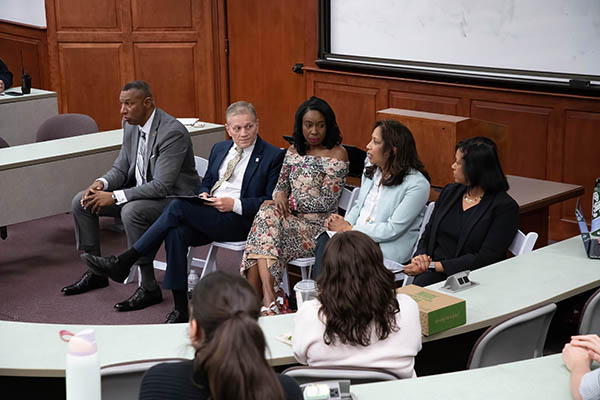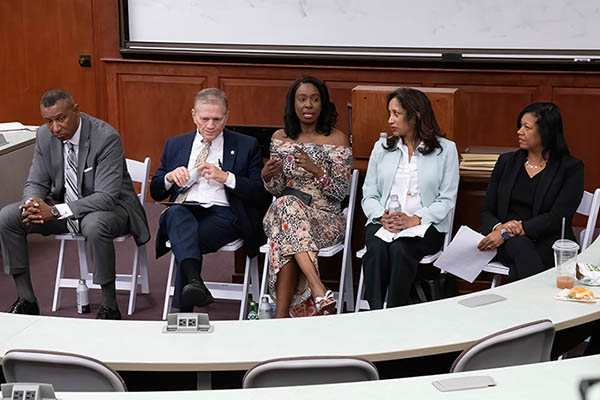Center for Criminal Justice Policy and Reform Examines “Criminal Justice Innovations”
On April 8, William and Mary’s Center for Criminal Justice Policy and Reform (CCJPR) hosted a panel on “Criminal Justice Innovations in a Polarized Climate.”
The event featured a powerful discussion on public safety, systemic trust, and transformative approaches to criminal justice reform.
Kami Chavis, Director of the CJPR, led the panel, which included members of the Law Enforcement Leaders to Reduce Crime & Incarceration, a national coalition launched by the Brennan Center for Justice in 2015. The group, now comprised of more than 200 current and former law enforcement leaders, aims to reduce incarceration while simultaneously advancing public safety—a message that was central to the event's conversation.
Rosemary Nidiry, Senior Counsel for the Law Enforcement Leaders Initiative at the Brennan Center, also participated in the panel, offering insights into the coalition’s national efforts and policy priorities. Professor Chavis moderated a discussion with current and former law enforcement officials, including Nidiry, Louis Dekmar, Bobby Kimbrough, and Stephanie Morales ’09.
 Panelists shared perspectives from across the justice system, highlighting the urgent need to rebuild community trust, address root causes of crime, and collaborate with mental health and social service providers. Prosecutor Stephanie Morales, Commonwealth’s Attorney for the City of Portsmouth Va., emphasized that communities are less safe when they fear both crime and the justice system, calling for procedural justice that extends beyond the courtroom.
Panelists shared perspectives from across the justice system, highlighting the urgent need to rebuild community trust, address root causes of crime, and collaborate with mental health and social service providers. Prosecutor Stephanie Morales, Commonwealth’s Attorney for the City of Portsmouth Va., emphasized that communities are less safe when they fear both crime and the justice system, calling for procedural justice that extends beyond the courtroom.
Bobby Kimbrough, Forsyth County Sheriff in North Carolina, spoke at length about the importance of community credibility and the need to build authentic relationships with residents, particularly youth. He stressed that many offenses stem from unmet basic needs such as food, housing, and emotional support.
To break the cycle of crime, Kimbrough highlighted the importance of proactive community engagement, mentoring programs, and early intervention strategies that provide support before youth enter the system. His department works closely with schools, local organizations, and families to provide resources and guidance, prevent juvenile justice involvement, and foster long-term community wellness.
Former police chief of LaGrange, Ga., Louis Dekmar addressed how media-driven fear can distort public perceptions of crime and called for greater collaboration between law enforcement and service providers to meet the needs of people experiencing homelessness and mental health crises. The panel also reflected on bipartisan reform efforts like the First Step Act and explored the need for record restriction laws, post-incarceration support, and more humane language when referring to incarcerated individuals.
The panel marked the final event in the Center’s 2024–25 Unlocking Justice series, which brought together thought leaders, advocates, and practitioners to examine critical issues in the criminal legal system. Throughout the year, the Center hosted conversations with law enforcement leaders, formerly incarcerated individuals, and progressive prosecutors—all with the shared goal of exploring how to reduce violent crime without increasing mass incarceration.
Ending the series with a dynamic discussion on community trust, procedural justice, and holistic approaches to public safety underscored the Center’s commitment to fostering inclusive dialogue and driving forward-looking reform in the pursuit of a more just system.